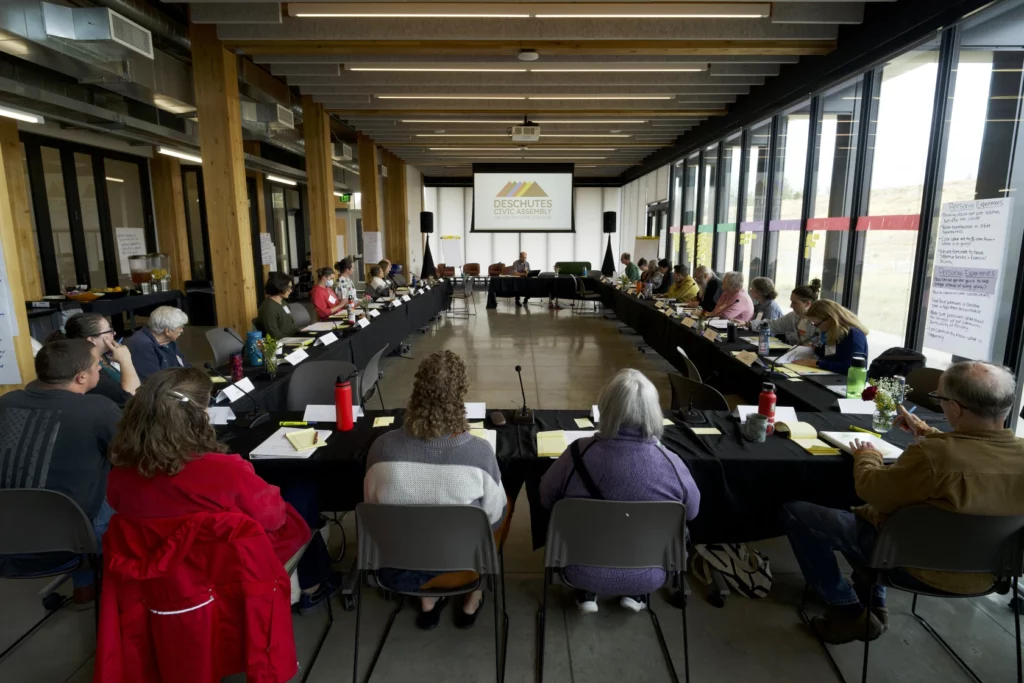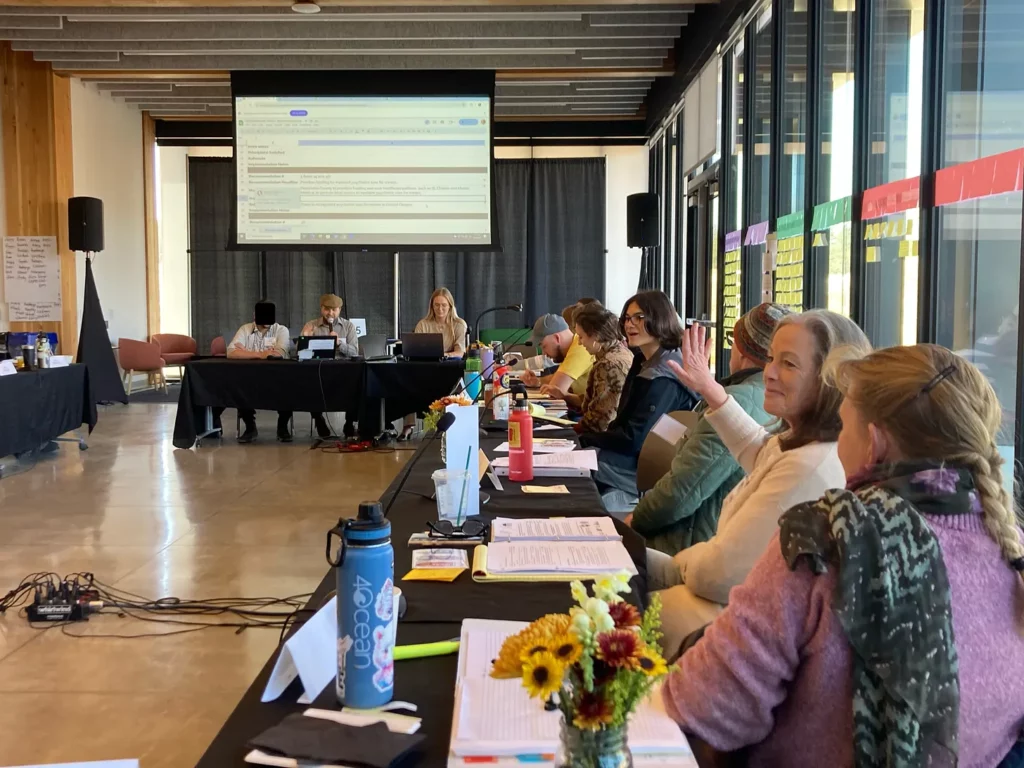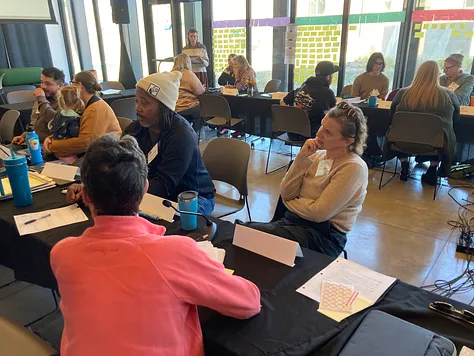Deschutes Civic Assembly on Youth Homelessness
2024 BEND, Oregon

In Fall of 2024 and in the midst of a presidential election, political polarization hit a fever pitch around the United States. At the same time, a group of everyday people, randomly chosen, came together to help their community.
Working alongside political and socioeconomic differences, they demonstrated a powerful model for collaboration and rebuilding trust between communities and institutions. Wahoo Films joined us to produce this short documentary showcasing their inspiring work. Watch and see how everyday people can set a new standard for governance and show us how we can do better, together.
The Challenge
Deschutes County sits at a socio-political crossroads. In 2022, Bend’s level of income inequality was in the top 12% in the United States, and in 2024, Central Oregon was in the top five rural places in the U.S. for its rate of homeless families and youth.
Youth homelessness is a multi-faceted, intersectional issue, and those who experience it are severely underrepresented in the public decision making that affects their lives. With support from the Central Oregon Youth Action Board (YAB) – a group of youth with lived experience of homelessness – and its grassroots beginnings, the assembly was uniquely-positioned to answer the complex question:
“What should our priorities be for building community solutions to prevent and end youth homelessness?”

Our Approach
Healthy Democracy brings a commitment to integrity and equity in its design. In collaboration with our partners, the Deschutes Civic Assembly prioritized an additional element: innovation. Our partners DemocracyNext and the MIT Center for Constructive Communication initiated the tech-enhanced aspect: AI that recorded the Delegates’ deliberations to find patterns, form predictions, and identify ways to make assemblies more efficient. Local partner The Central Oregon Civic Action Project (COCAP), introduced grassroots organizing, forming relationships with local electeds and building momentum to make Central Oregon a hub for deliberative democracy. The YAB contributed invaluable insights, their life experience enhancing both the design of the assembly and the information the Delegates received.


- Introductory presenters and documents selected by a Content Committee
- Presenters and documents requested by assembly Delegates
- Plenary presentations
- Small-group discussions with guests
- A free-form “information fair,” where Delegates could seek out additional information or policy analysis from guests seated around the room
- A selection of introductory printed documents
- Digital document archive
- AI-summaries of small-group discussions, for better access to the personal experience of fellow Delegates and small-group discussions with guests
- A variety of plenary and small-group debriefing and synthesis methods
The Content Committee was composed of local stakeholders with experience and expertise on youth homelessness. A community survey was also shared to gather suggestions for resources and presenters. The Content Committee reviewed the results of this survey, deliberated on suggestions, identified gaps, and collaboratively prioritized the first weekend of presenters and resources for the assembly. Any resource that was suggested but not included in the initial packet was made available to the Delegates in a digital archive.
After the first weekend the Delegates took the reigns and requested additional presenters and documents. These requests were then filled by staff in collaboration with the Content Committee.
Have questions about our approach?
Results
By the end of the assembly, Delegates had produced a series of recommendations, 23 of which were supported by 75% or more of the assembly. Delegates publicly presented the recommendations that received majority support to members of the YAB on the last day of the assembly, to the Central Oregon Intergovernmental Council on November 7, 2024, and to the City of Bend on November 11, 2024. Deschutes County and the City of Bend both committed to reviewing and publicly responding to the recommendations.
-A recreation center that would be run by Bend Parks and Recreation.
-A safe space for at-risk teens.
-Designated space for programs and non-governmental organizations that
would allow teens to access benefits at one central location.
Would increase availablity of resources and foster awareness and involvement with the community. Bend Parks and Recreation has an extensive volunteer core that would be a valuable resource to tap into.
Delegate Testimonials
‘”…the words running through my head right now are gratitude and hope. I was really scared coming into this process that I was going to be walking into a room full of people diametrically opposed…the cordiality and the ability for this community to come together is inspiring…”
“I don’t speak up very often, but I want you to know it’s been an incredible pleasure to be with all of you…”
“…I came into this process a skeptic…thanks for giving me hope…”
In the News
Jan 22, 2025, by Rolando Hernandez | OPB Listen to the podcast here. Note: The following transcript…
Continue to Post Deschutes County citizens come together for civic assembly
Jan. 16, 2025 – Dana Taylor | USA Today Citizen assemblies involve ordinary people participating in crafting…
Continue to Post Our faith in democracy is at an all-time low. Can citizen assemblies help?
An Oregon county is looking for solutions to youth homelessness—so it convened a random selection of residents…
Continue to Post What Could Citizens’ Assemblies Do for American Politics?
Additional Information
Session Materials
Pre-Assembly
Day 1 – Sunday, September 14th
Day 2 – Sunday, September 15th
- Day 2 Public Agenda
- Day 2 Livestream
- Day 2 HD Presentation
- Day 2 Panel and Small Groups: YAB Members
- Day 2 Presentation: Matt R., Oregon Dept. of Human Services
- Day 2 Presentation: Sandy S., Mckinney-Vento Program
- Day 2 Workshop Community Representatives
- Day 2 Delegate Workshop Notes
- Delegate Principle Suggestions
Between Sessions
Day 3 – Friday, October 4th
Day 4 – Saturday, October 5th
Day 5 – Sunday, October 6th
Advisory Committee Materials
Post-Assembly Subcommittees
Press Releases
Media Orientation
Consent Forms

Thank You to our Funders
